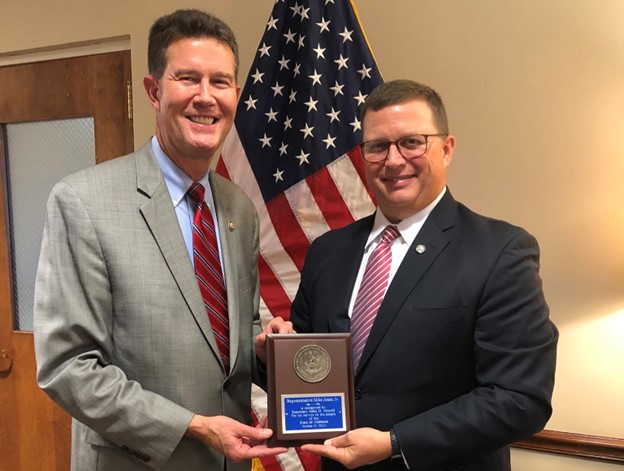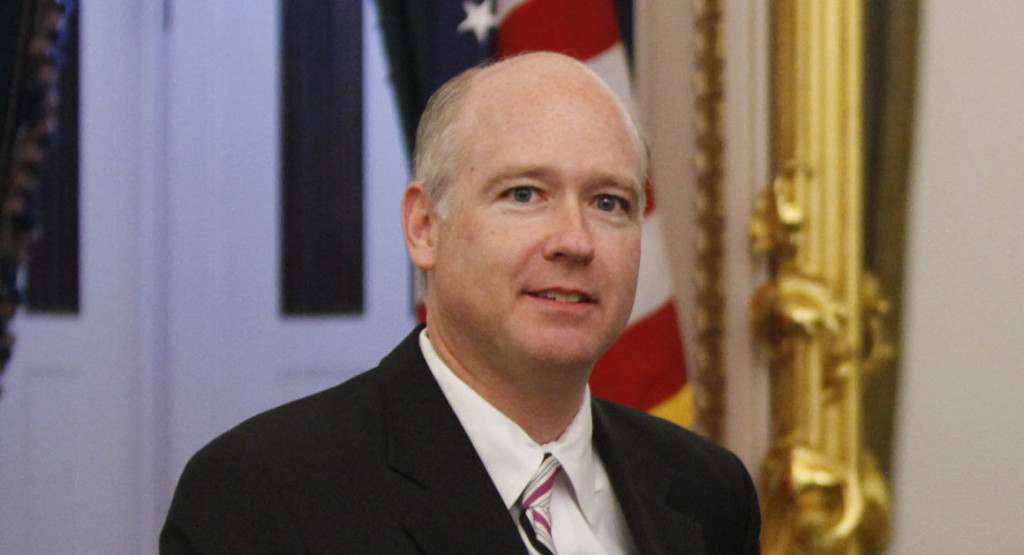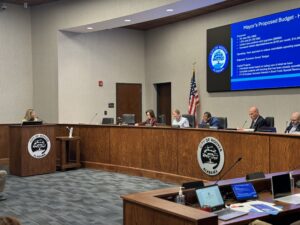Alabama middle school teacher James Miller under fire for volunteering as drag queen in free time

Huntsville middle school teacher James Miller spends his free time as a drag queen and has a Facebook page under the name “Madge D. Ivine (Miss Majesty Divine). The Mountain Gap Middle School teacher frequently posts pictures of himself on social media attending drag events like Drag Queen Story Time. Miller recently made inappropriate comments at a Drag Queen Story Time that was geared toward kids. At one of the story time events that was hosted at Hard Knocks Rescue & Training, Inc., an animal rescue organization, Miller made a comment while reading a book about a dog that hid its bone, saying in front of a group of children, “Everybody loves a big bone.” Libs of Tik Tok first reported the story. The September 24 event was live-streamed by the shelter. Miller, who has been a teacher for 27 years, responded in an interview with WAAY TV after receiving threats from people around the country. He’s worked as a drag queen as a side business, and it has never interferred with his teacher career. “I became a teacher because I wanted to be that inclusive person that I needed when I was in middle school that I didn’t have,” Miller explained. “I’ve created a classroom based on that. I’ve created an advocacy for kids based on that. I became an activist based on that. I do my job well, and I’m proud of what I’ve done. I’m proud of what I’ve put together, and these things they’re saying about me are flat out lies. They’ve twisted it so they can make a lie out of it. I will continue to be an advocate for my LGBTQIA community and my students and for the ones tha are not a part of that community.” Two volunteers/helpers of Hard Knocks Rescue & Training also issued a response on social media supporting Miller and advocated for people who don’t feel included. They emphasized that their mission was to work with, “outcast dogs and underdogs…ones that no one wants to work with.”+ “We would rather be excluded for those we include than included for those who we exclude,” they stated. The group also called on others to come and help their mission and raise funds for their organization. “You don’t have to be a drag queen. You can be a preschool teacher, you can be a minister, you can be anybody you want. If you want to come and support our mission and help us raise funds, which is all Madge is doing, please do.” They encouraged anyone to volunteer. “We have absolutely no kind of reservations about people that we bring in. Dolly Parton, if you want to come in, please do.” Miller says he is being threatened online, and his personal information has been released. He also says he’s received death threats. The owners of the non-profit he volunteers for says they have reported the situation to the police. Huntsville city schools stated that they are looking into the entire situation, but it is not a school related event, it’s a personnel issue and wouldn’t make any further comment.
Mayor Randall Woodfin calls for solutions to Birmingham’s historic flooding issues

During an event held on Monday, Birmingham Mayor Randall Woodfin spoke about how Birmingham’s history and geography have created the “perfect storm” for flash flooding conditions in the city. 1819 News reported that Woodfin joined a panel of experts at the Bloomberg CityLab summit in Amsterdam, Netherlands. The event was hosted by Bloomberg Philanthropies and the Aspen Institute. Woodfin joined mayors from Washington, D.C., Cincinnati, and San Francisco, along with international mayors. “CityLab this year visits one of the most creative cities in the world to elevate what’s new, learn from what’s working, and bring together a global community of public innovators,” said James Anderson, who leads the Government Innovation program at Bloomberg Philanthropies. “Big thank you to Mike Bloomberg and Bloomberg philanthropies and Aspen Institute for allowing me to share Birmingham’s story on extreme weather-related events caused by climate change and how we can better prepare for a wetter future,” Woodfin said. “Here’s the favorite part,” the mayor added, “none of it was on the taxpayer’s dime. [Organizers] asked me to speak, and they told me they wanted to cover the trip.” The discussion focused on flash flooding in cities and how climate change affected it. Woodfin was asked about flooding in Birmingham. Woodfin described a bit of the history of Birmingham and how the population of Birmingham has shrunk over the last few decades. He also described how the city sits in a valley. “We’ve had to grapple with environmental injustice stemming from soil and air issues for quite some time. I’ve been serving as mayor for the last five years. What I didn’t know when I signed up for this job was that I would also have to compete with extreme weather events such as flash flooding,” Woodfin stated. “Remember, we sit in a bowl, so we’ve already been dealing with tornados pretty much since time. But over the last two years, with these extreme weather events and the humidity in Birmingham and all these other things that converge at one time — just since January 1, everybody, we’ve had 86 water rescues in a city that’s landlocked. That’s kind of extreme when you think about it for firemen and firewomen who sign up for a job to put out fires, but they’re doing water rescues.” Woodfin went on to say that of the city’s 27,000 inlets, 18,000 have been assessed and found to be “past their lifespan.” He stated, “If we wanted to pave every street in our city it would be about a $50 million price tag, but to get our storm water infrastructure up to where it needs to be a $50 billion price tag.” The city has looked at repurposing empty lots and planting more trees, and trying to create fewer “asphalt parking lot” issues. Woodfin considers Joe Biden’s Bipartisan Infrastructure Law as a partnership that will help the city. “This bill is a once-in-a-lifetime for a city like Birmingham to get water infrastructure right, and that will be probably our main partner,” Woodfin said. Woodfin was asked how race and equity have impacted flooding in Birmingham, he discussed how he believed racism affected the layout of the city, leaving black neighborhoods in the worst areas for pollution and flooding. “Race sits at the center of the city of Birmingham and has been since probably its inception. I would dare say we’re probably the poster child for redlining neighborhoods. The city of Birmingham is a city made up of 23 communities and 99 neighborhoods,” Woodfin explained. “In the steel industry, black residents and their neighborhoods were right by these plants. So well before we talk about these extreme weather patterns, the intentional design of redlined neighborhoods by putting black residents — in a city that’s now 70% black — putting black residents near these smokestacks, living in floodplains, living in areas where your ingress and egress is surrounded by train tracks on all sides. All of this was definitely intentionally deliberate. So in the last five years, everything we do is centered around justice, racial equity.” Woodfin continued, “We’ve actually created the Mayor’s Office of Social Justice and Racial Equity where climate change has to be a part of the conversation because these extreme weather patterns are affecting those same neighborhoods I just described more so than other areas of town where they may stay on hills or heights,” he said. At the end of the discussion, the speakers were asked for positive solutions to flooding. Woodfin called for bipartisan efforts to address climate issues. “I would just say, water as we know it is a basic necessity of life,” Woodfin argued. “It is a quality-of-life issue from a municipal standpoint. It doesn’t have to be a divide on solving this issue. It doesn’t have to be Republican, Democrat, urban, or rural. This is an issue we all should be behind trying to figure out how to solve, particularly on the extreme weather pattern side.” Woodfin is serving his second term as Birmingham’s mayor.
John Merrill awards medal to Mike Jones

Alabama Secretary of State John Merrill recognized Alabama State Representative Mike Jones Jr with the National Association of Secretaries of State (NASS) Medallion Award. The NASS Medallion Award allows individual Secretaries of State to recognize outstanding service and dedication to furthering the mission of NASS within the states. The NASS Medallion Award was created to honor individuals, groups, or organizations with an established record of promoting the goals of NASS in one or more of the following areas: elections, with special emphasis on voter education and participation, civic education, including the teaching, promotion and study of this subject, service to state government, specifically as it relates to the duties of the office of the Secretary of State or a commitment to giving – a business or individual whose philanthropic contributions have significantly enhanced the quality of life in a local or regional area within a state or within an entire state. “I am extraordinarily appreciative to Chairman Jones for his service and contributions to District 92 and the great State of Alabama for his twelve years of service in the House of Representatives,” Merrill said in a statement. Chairman Jones works as an attorney with his own law office in Andalusia and has served as a councilman for the City of Andalusia, where he served as the mayor pro tempore, as well as a municipal judge. Jones was elected in the 2010 Republican wave election, along with Merrill, which gave Republicans control of both Houses of the Alabama Legislature for the first time in 135 years. Jones has held a number of leadership positions in the House, including Judiciary Chairman and Rules Committee Chairman. He was elected in House District 92. Merrill said that Jones has sponsored numerous bills that have greatly benefited the citizens and the great State of Alabama. Jones gave up his House seat to run for State Senate but was defeated in the Republican primary. Merrill was elected to the office of Secretary of State in 2014 and re-elected in 2018. He is term-limited from running for the office again. To connect with the author of this story, or to comment, email brandonmreporter@gmail.com.
Robert Aderholt says Joe Biden should focus on developing American energy, not pressuring OPEC to raise production

Last week, President Joe Biden expressed disappointment after OPEC countries cut oil production in order to raise prices. Congressman Robert Aderholt said that the President should focus instead on increasing domestic oil and gas production rather than asking other countries to produce the energy needed to lower Americans’ fuel prices. “In just a matter of days, gas here in the district has gone up more than 40 cents a gallon,” Rep. Aderholt posted on Facebook. “Meanwhile, President Biden is begging OPEC to increase production, while refusing to focus on increasing our own domestic sources.” After Saudi Arabia and other oil-producing nations cut oil production in response to dropping oil prices, Biden said that despite the Saudi actions, he does not regret his visit to the oil rich country. Gas prices had risen to over $5 a gallon in Alabama, and President Biden opened up the country’s strategic oil reserves. Now those reserves are depleted, and gas prices are beginning to rise as Americans move into the holiday season and Americans spend money to heat their homes. Republicans, including Aderholt and Congressman Gary Palmer, have blamed the President’s executive orders limiting American oil and gas exploration as well as shutting down construction of the Keystone XL pipeline. Palmer said that high energy prices will hit American families hard this winter. “20 million Americans are already behind on their utility bills even before the winter months settle in,” Palmer posted on Facebook. “Instead of placating environmental activists, our country deserves leaders that work for the good of those struggling to make ends meet for themselves and their families.” Environmental activists claim that the burning of fossil fuels is causing global warming leading to climate change, rising oceans, forest fires, and other calamities. President Biden has warned that there will be consequences for the oil-producing countries, including Saudi Arabia, voting with Russia to cut their oil production. “There’s going to be some consequences for what they’ve done with Russia,” Biden said of Saudi Arabia in an interview with CNN’s Jake Tapper. “I’m not going to get into what I’d consider and what I have in mind. But there will be…… there will be consequences.” Under former President Donald Trump, American oil and gas production increased to the point that the United States became the largest producer of energy in the world and America became a net exporter of energy. Those policies were opposed by environmentalists and Democrats. After Biden’s inauguration, he wrote several controversial executive orders limiting oil and gas exploration and drilling in America. Republicans hope that the rising energy prices will lead to more Republican voters going to the polls and electing Republicans this fall in the November 8 midterm elections. Robert Aderholt has represented Alabama’s Fourth Congressional District in the U.S. House of Representatives. He and Palmer are both running for re-election on November 8. To connect with the author of this story, or to comment, email brandonmreporter@gmail.com.
Spring Hill College announces first woman president in its 192-year history

Spring Hill College recently announced the hiring of Mary Van Brunt, who will serve as the first woman president in the school’s 192-year history. Brunt will become the 39th president starting in January 2023. Brunt is currently the Provost and Vice President of Academic Affairs at Gwynedd Mercy University in Gwynedd Valley, Pennsylvania. The school held a nationwide search for the position. According to the school, “The purpose of the committee is to lead and manage the search process and, with the assistance of the College’s consultant partners from AGB Search, to identify, recruit and recommend to the Board of Trustees the strongest possible candidates for the presidency.” “I am delighted to have been chosen to lead Spring Hill College,” Van Brunt said in a statement. “I look forward to connecting with the Spring Hill community and carrying out the centuries-old Jesuit tradition of caring for the intellectual, spiritual, and social growth of our future servant leaders. The mission coupled with the liberal arts education resonates with me and aligns with my Catholic faith and personal values.” E. Joseph Lee, II, Ph.D. announced his retirement in January. “This decision has not been an easy one, as Spring Hill has been such an important part of my life during the last three and a half years,” Lee said in January. “The students, faculty, staff, and the entire SHC community are absolutely the best! Now is a good time as the College is positioned for future growth and prosperity. It is with that in mind that I feel now is the time to prepare for new leadership.” Spring Hill College was founded in 1830. It is the oldest Catholic college in the Southeast and the third-oldest Jesuit college in the U.S. Jack McKinney, chairman of the Spring Hill College board of trustees, thanked Lee for his service to the school. “After carefully vetting more than three dozen pre-screened candidates, we are delighted that Dr. Van Brunt has graciously accepted the offer to become our next President. We are grateful to Dr. Lee for his vision and his leadership,” said McKinney. “He led us through the challenges of the COVID-19 pandemic, helped the College develop new and award-winning academic majors, and strengthened community partnerships with the military, local businesses, and schools.” Van Brunt has over 20 years of leadership experience in Catholic high education. She earned a Bachelor of Arts degree in Economics from Ursinus College in Collegeville, Pa., a Master of Business Administration in Accounting from St. Joseph’s University in Philadelphia, Pa., and a Ph.D. in Economics from Lehigh University in Bethlehem, Pa. She is relocating to Mobile with her husband, Chris, and their dog, Stella.
DOJ finds Alabama’s foster care system violates law

The federal government on Wednesday said the state of Alabama illegally discriminates against children in foster care with behavioral and emotional disabilities. The U.S. Department of Justice, in a news release, said the state’s foster care program has illegally placed hundreds of students with disabilities into “segregated and inferior educational programs,” a direct violation of Title II of the Americans with Disabilities Act. “Students with disabilities in Alabama’s foster care system are among the most vulnerable in the state’s care, and they deserve better than placement in segregated and inferior schools,” Assistant Attorney General Kristen Clarke, of the department’s Civil Rights Division, said in a statement. “The Civil Rights Division will defend every child’s right to equal educational opportunities in schools where they can be supported and challenged.” The department’s findings follow an investigation into allegations that the state denies children in foster care equal opportunity to basic educational services on the basis of disability. Gina Maiola, communications director for Gov. Kay Ivey, said in a statement that the Alabama State Department of Education and the Department of Human Resources have been “working proactively since 2018 to address the needs of our specialized treatment centers.” “These two agencies have been in communication with the Department of Justice to inform them on the steps being taken in that regard. I know the ALSDE and DHR will address any specific concerns given by the USDOJ. Bottom line, a top priority of the Ivey Administration is to ensure every Alabama student has the ability to receive a quality education,” Maiola said. The state is required to provide educational services for children in the foster care system, including when children are placed in psychiatric residential treatment facilities. According to the DOJ, students who are placed in such treatment facilities are automatically enrolled in segregated on-site schools without an appropriate educational assessment. In these segregated placements, the DOJ said students lack access to age-appropriate study materials, adequate instruction, and facilities such as libraries, science labs, and gyms. “These unnecessary placements, which can extend for long periods of time, sever children’s ties to their home schools, teachers, social activities, and peers,” Clarke’s office said. “The department concluded that, in most cases, these children could be appropriately served in general education settings where they would receive the many documented academic and social benefits of inclusion.” Republished with the permission of The Associated Press.
Attorneys: Alan Eugene Miller endured ‘torture’ during execution attempt

An Alabama inmate said prison staff poked him with needles for over an hour as they tried to find a vein during an aborted lethal injection last month. At one point, they left him hanging vertically on a gurney before state officials made the decision to call off the execution. Attorneys for 57-year-old Alan Eugene Miller wrote about his experience during Alabama’s September 22 execution attempt in a court filing made last week. Miller’s attorneys are trying to block the state from attempting a second lethal injection. Two men in scrubs used needles to repeatedly probe Miller’s arms, legs, feet, and hands. At one point, using a cell phone flashlight to help their search for a vein, according to the October 6 court filing. The attorneys called Miller the “only living execution survivor in the United States” and said Alabama subjected Miller “to precisely the unnecessary and wanton infliction of pain that the Eighth Amendment was intended to prohibit.” Alabama has asked the state Supreme Court to set a new execution date for Miller, saying the execution was canceled only because of a time issue as the state faced a midnight deadline to get the lethal injection underway. “Despite this failed execution, the physical and mental torture it inflicted upon Mr. Miller, and the fact that Defendants have now botched three lethal injection executions in just four years, Defendants relentlessly seek to execute Mr. Miller again—presumably by lethal injection,” attorneys for Miller wrote, referencing an execution that was canceled and another that took three hours to get underway. “What then, in Defendants’ view, is a constitutional amount of time to spend stabbing someone with needles in an attempt to kill them?” his attorneys wrote. The 351-pound (159-kilogram) inmate testified in an earlier court hearing that medical workers always have difficulty accessing his veins, and that is why he wanted to be executed by nitrogen hypoxia, a newly approved execution method that the state has yet to try. Miller said he was led into the execution chamber at 10 p.m., about an hour after the U.S. Supreme Court lifted an injunction that had been blocking the lethal injunction, and was strapped to the gurney at about 10:15 p.m. After the two men used needles to probe various parts of his body for a vein, also using a phone flashlight to help, Miller told the men, “he could feel that they were not accessing his veins, but rather stabbing around his veins.” Later, a third man then began slapping his neck in an apparent attempt to look for a vein. The three men in scrubs stopped their probing and left the chamber after there was a loud knock on a death chamber window from the state’s observation room, according to the court filing. A prison officer then raised the gurney to a vertical position. Miller said the wall clock read 11:40 p.m., and he estimated that he hung there for about 20 minutes before he was let down and told that his execution was canceled for the evening. “Mr. Miller felt nauseous, disoriented, confused, and fearful about whether he was about to be killed, and was deeply disturbed by his view of state employees silently staring at him from the observation room while he was hanging vertically from the gurney. Blood was leaking from some of Mr. Miller’s wounds,” the motion stated. Miller was sentenced to death after being convicted of a 1999 workplace rampage in which he killed Terry Jarvis, Lee Holdbrooks, and Scott Yancy. “Due to the lateness of the hour, the Alabama Department of Corrections was limited in the number of attempts to gain intravenous access it could make. ADOC made the decision to halt its efforts to obtain IV access at approximately 11:30 p.m., resulting in the expiration of the court’s execution warrant,” the state attorney general’s office wrote in the request for a new date. This is at least the third time Alabama has acknowledged problems with vein access during a lethal injection. The state’s July execution of Joe Nathan James took more than three hours to get underway. Alabama called off the 2018 execution of Doyle Hamm after being unable to establish an intravenous line. Republished with the permission of The Associated Press.


